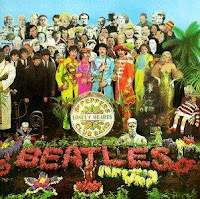2007 WSOP, Day 2: Good Morning, Good Morning
 ’Twas a late one, last night. Spent most of it monitoring action from yesterday’s Mixed Hold ’em event (Event No. 1). Of the 452 entrants who ponied up the $5,000 entry fee, it looks as though they are now down to just under a hundred players left, with hockey-player, pajama-wearer Greg “FBT” Mueller at the top of the chip list. They’ll play down to the final table today, then finish on Sunday.
’Twas a late one, last night. Spent most of it monitoring action from yesterday’s Mixed Hold ’em event (Event No. 1). Of the 452 entrants who ponied up the $5,000 entry fee, it looks as though they are now down to just under a hundred players left, with hockey-player, pajama-wearer Greg “FBT” Mueller at the top of the chip list. They’ll play down to the final table today, then finish on Sunday. These mixed games are going to be intriguing to follow, I think. The three H.O.R.S.E. events (Nos. 16, 26, and 39) will be fun, of course, but I’m also looking forward to the more unusual combinations they’ve created this year, like this Event No. 1 (and Event No. 40, also Mixed Hold ’em), Event No. 5 (combining Omaha 8/b and Stud 8/b), and Event No. 51 (S.H.O.E.).
Was thinking about why I find these mixed games so fascinating when I happened to read an article this morning that seemed like it might provide at least a partial explanation.
The article is by Daniel J. Levitin of The Washington Post and it commemorates the 40th anniversary of the release of the Beatles’ Sgt. Pepper’s Lonely Hearts Club Band. Levitin focuses on how Beatles’ songs and melodies have endured over the past four decades, speculating why this has been (and will continue to be) the case. Levitin is a professor of psychology and music, and so his inquiry focuses largely on the brain or that “network of neural structures” that affect how we react to things like a heard melody.
“To a neuroscientist,” Levitin concludes, “the Beatles’ longevity can be explained by the fact that that their music created subtle, rewarding schematic violations of popular musical forms, causing a symphony of neural firings from the cerebellum to the prefontal cortex, joined by a chorus of the limbic system and an ostinato from the brainstem.”
The good professor might be pulling our leg here a bit with his musical metaphors, but I think I understand his essential point. The Beatles’ music is pleasurable (to a lot of us) because the songs so neatly combine familiarity and novelty. Like a great writer who operates within a “popular” or “colloquial” idiom -- for instance, my faves Hammett, Thompson, and other hard-boiled writers -- the Beatles took a familiar form (the pop song) and bended it just enough to allow us to continue to recognize the form, yet become fascinated (and never bored by) their alterations. There’s also that “Beatle”-flavor -- “the act you’ve known for all these years” -- that permeates all their songs, no matter how differently they sound from one another, giving us that pleasure-of-the-familiar while at the same time stimulating us with something new.
Might be something similar going on here in the Mixed Hold ’em event -- it looks like a regular HE tourney, but the game changes kind of knock one out the usual groove just long enough to appreciate anew those nuances and tactics that are peculiar to each game. I used to play NL a lot more, and at one time did a lot of switching back and forth between limit and no-limit. A guide I sometimes followed was when I felt myself becoming too loose in the limit game, I’d move over to no-limit where it generally paid more to loosen up. Then, when I felt I’d tightened up too much in no-limit, I’d move back to limit where tight was (often) right. The simple act of switching games tended to increase my concentration, forcing me to think more closely about the game at hand.
Something those players in Event No. 1 are experiencing every half-hour, I suppose. Challenging, to be sure, but also (can be) a hell of a lot of fun. Familiarity enhanced by novelty. Like moving from “She’s Leaving Home” to “Being for the Benefit of Mr. Kite” to “Within You Without You” to “When I’m Sixty-Four.” So different, and yet -- incredibly, really -- so similar.
Go check out PokerNews’ live reporting from the WSOP for the latest.
Labels: *high society














0 Comments:
Post a Comment
<< Home